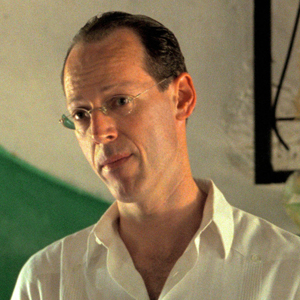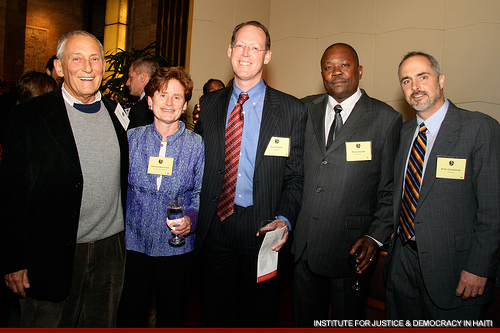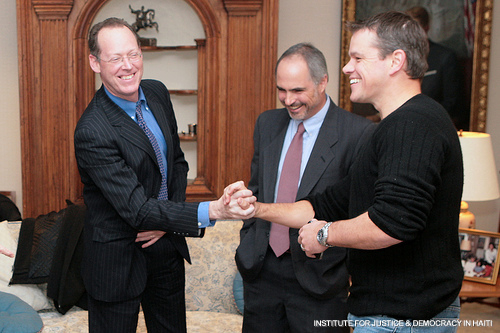
February 24, 2022
Dear IJDH community:
I would like to send my condolences to everyone who is suffering from the tragic loss of Paul Farmer- his family, his colleagues at Partners in Health and Zanmi Lasante, and the multitudes in the US, Haiti, Rwanda and so many other places who have been treated, befriended, taught and inspired by Paul. Although I am deeply saddened, shocked and feeling unmoored with Paul’s passing, it has been a great comfort to hear from so many from around the world conveying their grief but also conveying their recognition of all that Paul has meant to the Institute for Justice and Democracy in Haiti (IJDH) and the Bureau des Avocats Internationaux (BAI) and to so many others.
To return the favor, I thought it might be helpful to all of us to share some of my stories of Paul. If you would like to add your remembrance, or read what others in the IJDH community have to say, click here.
I met Paul’s ideas in 1995, when his Uses of Haiti was one of two books on Haiti in the local library (the other, equally serendipitous, was C.L.R. James’ The Black Jacobins. If you have not read both, I would recommend doing so). Uses still underpins my understanding of the international community’s contribution to poverty and instability in Haiti.
I met Paul in the flesh a year later, when I was working for the BAI in Haiti. I attended an event where Paul received a Human Rights award, and afterwards had the great fortune to join a group of people, mostly “blan”, for dinner at the Oloffson Hotel. Once we were seated, Paul went around the table asking what people were doing in Haiti, offering his typical encouragement to all. When he got to me, I started by saying I was reading his Women, Poverty and Aids.
Paul diplomatically indicated he believed I was lying (the book was hugely important, but hard sledding). Things went further downhill when I explained that the BAI was trying to get Haiti’s justice system to function fairly for Haiti’s impoverished majority by pursuing prominent political massacre cases. Instead of the encouragement he gave everyone else, Paul told me the justice system was hopeless, citing a recent experience trying to help a patient obtain justice. I explained that giving someone a ride to court and paying the court fees was like giving a TB patient medication and returning them to a life of hunger and crowded housing. Paul lit up with his trademark huge smile. His surprised “you really are reading my book!” kicked off a quarter century of friendship and collaboration.

The BAI borrowed whatever we could from the efforts of Paul and his Partners in Health/Zanmi Lasante colleagues to treat disease within a broken system. We started by adopting his “accompaniment” approach: listening carefully to what the people we were trying to help were saying about their affliction, and addressing the full complexity of their situation. While PIH and ZL provided the housing and nutrition support needed for the TB medication to be effective, the BAI helped massacre victims organize and advocate to give our legal work a chance of being effective.
PIH/ZL saw their patients’ illness as the consequence of broken systems: a Haitian government unwilling or unable to provide basic government services, including healthcare, electricity, education and support for economic development, and two centuries of the United States and other powerful members of the international community “using” Haiti to their own ends. PIH/ZL deployed the lessons learned from treating and speaking with their patients to help build Haiti’s national healthcare system and oppose international policies that kept Haiti impoverished. BAI likewise deployed lessons from its clients to help build and democratize Haiti’s justice system and oppose international policies that undermined justice in Haiti.
Paul’s inspiration was a big part of BAI succeeding in bringing the case of the 1994 Raboteau Massacre to a successful trial in late 2000. The icing on the cake of that victory was Paul discussing the trial’s importance in his next book, Pathologies of Power (that I would HIGHLY recommend), especially his conclusion that: “In convicting the high command, the trial also inculpated by association their benefactors abroad; the transnational mechanisms of structural violence were exposed clearly. Perhaps for this reason, as much as any other, the Raboteau trial went largely unnoticed in the US and foreign press, which instead ran story after story about how hopeless Haiti’s judicial and police systems were.”
Not long after the Raboteau trial, Paul invited my BAI colleague Mario Joseph and me to join Zanmi Lasante’s Healthcare is Human Right conference at the ZL campus in Cange, Haiti. The meeting was a revelation: Cange was then several hours over punishing (even by Haiti standards) unpaved roads from Port-au-Prince, but the conference featured cutting edge discussions from medical experts, patients and advocates from around the world. After the first day, I had a late night, helping Nancy Dorsinville –- who we tragically and irreplaceably lost just 10 months ago—translate the Cange Declaration on Healthcare as a Human Right. As we worked into the no-longer-so-wee hours of the morning, the Cange campus became deserted- except for Paul, who kept flitting by on some errand to ensure everything was set for the next day. In the morning I slept through breakfast, and went straight to the conference in time to hear Paul open the day with stories from all the patients he had spoken with that morning as he did his rounds.
Mario and I left the conference inspired to add healthcare and other economic and social human rights to the BAI’s portfolio, which had previously focused narrowly on civil and political human rights. Over the next two decades, the right to health has become central to our work, including the health and human rights in prisons collaboration with ZL for several years, the UN Cholera case, advocacy for respect for human rights in the response to natural disasters, and the health rights of sexual assault survivors.
When the US-supported coup d’état on February 29, 2004 reversed ten years of democratic progress in Haiti, Paul had his hands full. His hospital was busy treating the injured while navigating the violence and disruption unleashed in the capital and the Central Plateau around Cange. But he found time to write one of the seminal articles telling the truth about the coup. He also joined a conference call initiated by Ira Kurzban, with Laura Flynn, Irwin Stotzky, Judy Prosper, Mike Levy and me, on the theme “WE HAVE TO DO SOMETHING!” We decided that our something would be IJDH, and Paul served as a board member, inspiration, connector and guiding light for a few weeks’ shy of eighteen years.

Paul never won any perfect attendance awards on the IJDH Board. He usually made the in-person annual meetings, where he could laugh, cry, strategize, learn, teach and hug with old friends and new. With his many commitments Paul was less successful at making conference calls or responding to emails on organizational matters. But when we really needed him, Paul was always there.
On the day after Christmas, 2005 Paul hiked up a mountain in Rwanda until his phone showed enough bars to call me about Fr. Gerard Jean-Juste, Haiti’s most effective advocate for non-violent social change. Fr. Gerry had been illegally imprisoned by the coup d’état regime for denouncing the repression. The government had resisted the efforts led by Mario and his BAI colleagues to challenge the illegal detention—it fired a judge who had ordered Fr. Gerry’s release, and refused to allow subsequent court hearings. The US supported the regime, even backing up the regime’s insistence that Fr. Gerry was being treated legally and humanely.
The denials of mistreatment persisted even after Dr. John Carroll- a US doctor working in Haiti, and sometimes parishioner – examined Fr. Gerry in early December and reported he likely had leukemia. The denials persisted even after lawyer Bill Quigley alerted the international press to the leukemia diagnosis, and after Representatives Maxine Waters and Barbara Lee wrote President Bush urging him to use his influence with the Haitian government to insist Fr. Gerry be treated justly.
On his way out of Haiti to go to Rwanda for Christmas, Paul visited Fr. Gerry. The prison guards watched Paul closely to ensure he kept his promise that the visit was not a medical exam. They did grant Fr. Gerry’s request that he and Paul be allowed to kneel down and pray together in the makeshift prison chapel. I will let people more knowledgeable in Paul’s profession–or Fr. Gerry’s–determine the mechanism, but the prayer session led to a lab in Miami reporting that a test of Fr. Gerry’s blood confirmed he had leukemia.
Paul had hiked up the mountain to report the lab result, and to discuss how we could best use it to embarrass the Haitian government and its US supporters into releasing Fr. Gerry. The plan worked, and by the end of January Fr. Gerry was in a Miami hospital, getting the treatment he needed. Although Fr. Gerry did recover from cancer, he died tragically–another great loss–despite heroic efforts by Paul and many other doctors. His family and supporters suspect that Fr. Gerry was poisoned in prison.
With Paul’s superhuman schedule, I did not get a chance to see or speak with him often. But last week he called me from Rwanda to discuss his role with IJDH. Paul was feeling that he was unable to fulfill his board member duties, so we decided he would move to IJDH’s Advisory Council for now, where he thought he could contribute more effectively. The call was not supposed to be a good-bye. But we did have a chance to reminisce about our work together in the quarter century since the Oloffson dinner. Paul characteristically apologized for not being able to do more, but I will always be grateful I had the opportunity to thank him for all that he had done, for me, for IJDH and BAI, and for human rights in Haiti.
Paul was many wonderful things to many people. But what stands out for me is his insistence that fighting inequality is essential to any good-faith efforts to help the impoverished, and that “doing good” in places like Haiti requires us to not just contribute time, talent and resources, but to look unflinchingly in the mirror to examine how our countries, our organizations and we ourselves exercise our power to the detriment of Haitians’ rights.
Paul was also a master of building a community around the fight for social justice. His community is largest in healthcare, but this week I have heard from legal workers all over the world who carry Paul’s principles and inspiration with them to court, to the streets and to their classrooms. I am deeply grateful that Paul helped launch an IJDH community that includes so many past and present staff, volunteers, financial supporters and collaborators, all committed to Paul’s vision of relentless advocacy for respecting all of the human rights of all Haitians.
Paul’s passing leaves a great hole. We cannot replace him, but we can use what he taught us to continue the work he left undone. BAI and IJDH are committed to following Paul’s inspiration and direction wherever we need to go to support Haitians’ fight for justice and democracy. Paul’s torch is heavy, but it casts a great light. We look forward to carrying it with the whole community of people touched by Paul’s time spent among us.
Brian Concannon